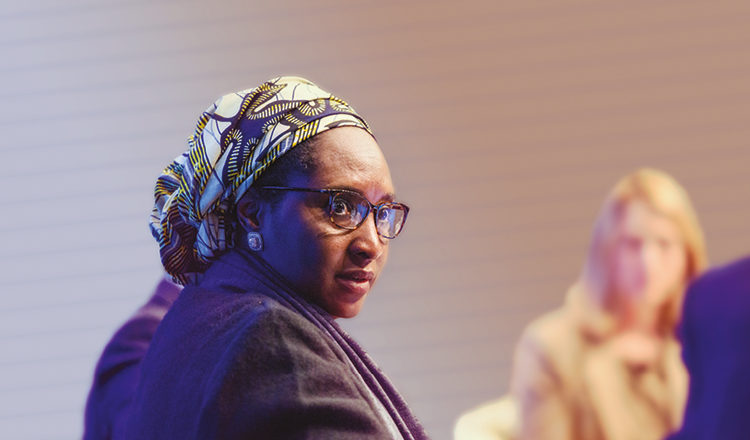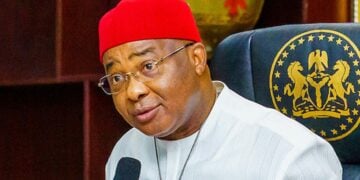Some state governors have voiced their dismay over Nigeria’s escalating debt profile, with fears that the country could face severe consequences if immediate measures are not taken to reverse the trend.
The governors spoke yesterday at the sidelines of the 2023 induction for re-elected and elected governors with the theme: Governing for Impact (Building Sub-national Governance), organised by the Nigeria Governors’ Forum (NGF) at the presidential villa, Abuja.
Bauchi State Governor Bala Mohammed expressed his concern that Nigeria’s debt servicing requirement currently stands at approximately 95 percent of its revenue. He cautioned that without intervention, the country was the risk of financial collapse.
Additionally, he questioned why the World Bank had not alerted the country’s economic managers as the debt burden exceeded sustainable levels.
Governor Mohammed emphasised the need to address the macroeconomic realities affecting the states, including the inadequate sharing of oil proceeds.
He called for a comprehensive restructuring of the country’s economic management, advocating for increased involvement of states in decision-making processes.
According to him, Nigeria’s economy remains heavily reliant on a single sector, and even within that sector, a substantial portion of revenue has been borrowed upfront, necessitating a review of the federation’s structure.
He said, “Our debt servicing requirement is about 95 percent of the revenue. And so the states are affected by this macroeconomic reality. The oil proceeds are not being shared. And we’re here celebrating success, what success?
“We are going to go under unless we do something inward to really correct our own perception, our own notions, and our own approaches to the management of the economy of the country.
“Honestly, you heard me ask a question. I wonder what the World Bank is doing. Apart from giving us grants, assistance in SFTAS, and of course loans, they should be able to raise a red flag, they should be able to tell the managers of our economy that we cannot continue to borrow endlessly.”
Pleateau State Governor-elect Caleb Mutfwang echoed Governor Mohammed’s sentiments, even as he emphasised the importance of collaboration between the federal and state governments to develop effective policies for debt reversal.
Mutfwang said that creating national wealth was crucial to alleviating poverty and generating the necessary funds to repay debts, just as he underscored the significance of diversifying and strengthening the economy, while improving productivity across all sectors.
Mutfwang said the goal of the government is lifting people out of poverty and fostering wealth creation, which would contribute to increased tax revenues and enhanced internally generated revenue.
On his part, Katsina State governor-elect Dikko Umar Radda pledged to conduct a comprehensive assessment of the state’s debt profile upon assuming office.
He expressed the intention to restructure the debt to ensure it aligns with the state’s obligations and benefits its citizens.
“As soon as I am sworn in, there would be a comprehensive assessment of the debt profile with a view to restructuring it in order to meet the obligations for the people of the state.”
Buhari Seeks Approval For Additional $800m Loan As Reps Adjourn Plenary Indefinitely
President Muhammadu Buhari has requested the House of Representatives to approve an additional $800 million loan for the National Social Safety Net Programme (NASSP) from the World Bank.
Speaker of the House, Femi Gbajabiamila read the president’s communication, entitled Request for Approval for Additional Financing of the National Social Safety Net Programme (Scale-up) by the National Assembly.
The House, however, adjourned sitting indefinitely after taking the letter from the president.
The lawmaker representing Ifo/Ewekoro federal constituency of Ogun State, Ibrahim Isiaka raised a Point of Order, relying on Order 6 (1) & (2) where he noted that his privilege as a member of the House was being breached due to the ongoing plenary that invariably denied him the opportunity of attending the induction training for lawmakers-elect currently taking place at the International Conference Centre. He noted that while at plenary, he can’t benefit from the ongoing training.
He, thereby, urged the House adjourn the plenary till after the induction training is concluded to enable the lawmakers-elect to participate in the training.
But the deputy speaker, Ahmed Idris Wase opposed the motion, saying that it is not the tradition of the House to adjourn the plenary to attend the induction training. He added that the adjournment is unnecessary as there were issues of national importance on the ground to be tackled by the House that might be affected by the adjournment.
The member from Kabba/Bunnu/Ijumu federal constituency, Tajudeen Yusuf, in his intervention said fairness dictates that if plenary could be adjourned for lawmakers-elect that were in the first batch of the programme, those in the second batch should not be denied.
“I want to appeal that if the training is ending, we should allow those who have the privilege of training to enjoy the benefit that it’s meant for,” he said.
The member representing Somolu federal constituency of Lagos State, Adomrin Kuye, said the ongoing training was exceptional, he thereby pleaded with the speaker to enjoy the benefit.
“Mr Speaker, I was there on Monday and Tuesday, and went there this morning. Just at the time the D.G Budget was going to take us, I and (I have a witness here), Hon Adeyemi had to rush out to attend plenary. New materials are being shared every day and this training was put together by this House,” Kuye said.
Speaker of the House, Gbajabiamila, before putting the question, noted that Isiaka had raised a fundamental question, noting that the induction programme was a right, not a privilege. According to him, if the lawmakers-elect in the first batch were allowed to attend the programme, the second batch must also be allowed, for fairness and equity.
Eventually the motion was moved for the House to be adjourned till whenever the induction is done. The induction is expected to end on Friday.
President Buhari in the letter said, “It is with pleasure that I forward the above subject to you. Please note that the Federal Executive Council (FEC) approved an additional loan facility to the tune of USD800 million to be secured from the World Bank, for the National Social Safety Net Programme (NASSP) and the need to request for your consideration and approval to ensure early implementation (Copy of FEC Extract attached).
“The House may wish to note that the Programme is intended to expand coverage of shock responsive Safety Net support among the poor and vulnerable Nigerians. This will assist them in coping with the costs of meeting basic needs.
“You may wish to note that, the Federal Government of Nigeria under the conditional cash transfer window of the programme will transfer the sum of N5,000 per month to 10.2 million, poor and low-income households for a period of six month with a multiplier effect on about 60 million individuals. In order to guarantee the credibility of the process, digital transfers will be made directly to beneficiaries’ accounts and mobile wallets.”
According to him, the NASSP, a social intervention programme, would stimulate activities in the informal sector, improve nutrition, health, education and human capital development of beneficiary households.





